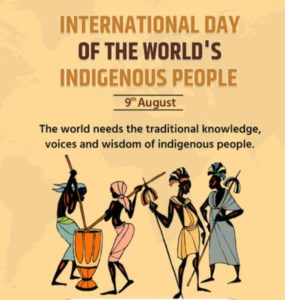World’s Indigenous People day is observed on August 9th each year. It was first proclaimed by the United Nations General Assembly in 1994 to raise awareness and promote the rights and well-being of indigenous populations worldwide. The day serves as an opportunity to recognize the rich cultural heritage, unique knowledge, and contributions of indigenous peoples to our global society. It also aims to address the challenges and issues they face, such as land rights, discrimination, and preservation of their traditional ways of life.
Table of Contents

History of World Indigenous People Day
The history of the International Day of the World’s Indigenous Peoples dates back to 1994 when the United Nations General Assembly proclaimed August 9th as the annual observance. The decision came in response to growing concerns about the marginalization and human rights issues faced by indigenous communities around the world.
The day was established to promote and protect the rights of indigenous peoples, recognizing their unique cultural diversity and contributions to humanity. It also aimed to raise awareness about the challenges they face, including land rights, access to education, health care, and preservation of their traditional knowledge.
Since its inception, the International Day of the World’s Indigenous Peoples has been an essential platform for advocacy and dialogue, providing an opportunity for indigenous communities to share their perspectives and concerns with the global community. Various events, conferences, and gatherings are held on this day to highlight the significance of indigenous cultures and to call for action towards a more inclusive and equitable world for all.
How To Celebrate International Day Of World Indigenous People
To celebrate the International Day of the World’s Indigenous Peoples, you can:
1. Educate yourself about indigenous cultures and histories.
2. Attend local events or gatherings organized by indigenous communities.
3. Support indigenous businesses and artisans by purchasing their products.
4. Advocate for indigenous rights and respect for their traditional lands and resources.
5. Raise awareness on social media using relevant hashtags and sharing informative content.
6. Participate in workshops or activities that promote cultural exchange and understanding.
7. Engage in conversations that highlight the importance of preserving indigenous languages and traditions.
8. Donate to organizations working towards indigenous rights and welfare.
9. Learn and share traditional knowledge and practices with permission and respect.
10. Join or support initiatives that address environmental and social issues affecting indigenous communities.
Why To Celebrate
The World’s Indigenous People Day is celebrated on August 9th each year to promote and protect the rights of indigenous populations worldwide. It aims to raise awareness about their unique cultures, traditions, and contributions to society. The day also highlights the challenges they face, such as discrimination, marginalization, and the need to preserve their lands, languages, and heritage. By commemorating this day, the international community acknowledges the importance of respecting and supporting indigenous peoples’ rights and well-being.
Significance
The International Day of the World’s Indigenous Peoples, observed on August 9th each year, holds significant importance as it aims to promote and protect the rights of indigenous peoples worldwide. The day serves as a reminder of the unique cultures, traditions, and contributions of indigenous communities to the world’s diversity and heritage.
Indigenous peoples are custodians of ancient traditions, languages, and practices that are deeply intertwined with their ancestral lands. Their profound connection with nature, coupled with their traditional knowledge, offers valuable insights into sustainable living and environmental conservation. However, these communities often face marginalization, discrimination, and encroachments on their land and resources, threatening their way of life.
The observance raises awareness about the challenges faced by indigenous populations, such as discrimination, land rights issues, poverty, and cultural preservation. It also provides an opportunity for governments, organizations, and individuals to engage in dialogue and take actions to support indigenous rights, sustainable development, and inclusive policies.
The day further highlights the importance of respecting the rights, knowledge, and perspectives of indigenous peoples in efforts to achieve social justice, sustainable development, and cultural diversity. It underscores the need for collaboration and partnership to ensure that indigenous communities can thrive and flourish while maintaining their identity and way of life.
Conclusion
The World Indegineous People is a crucial occasion that aims to raise awareness about the rights, cultures, and challenges faced by indigenous communities worldwide. By recognizing their unique contributions to humanity and their deep connection with the environment, this day calls for greater respect and protection of their rights. Through education, advocacy, and support, we can work towards a more inclusive and equitable world for all indigenous peoples. Let us embrace diversity, promote cultural heritage, and collaborate to build a sustainable future that honors the richness of indigenous cultures. Together, we can forge a path towards social justice and empowerment for indigenous communities.
Click on the following link
